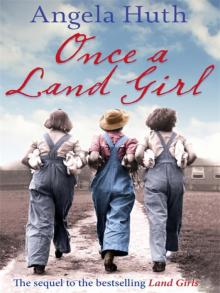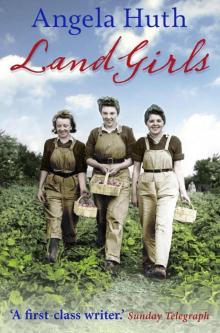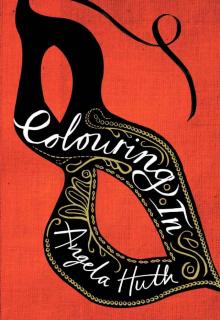- Home
- Angela Huth
Nowhere Girl Page 3
Nowhere Girl Read online
Page 3
‘Good.’
‘He asked after you and I said you were all right. You are, aren’t you?’ He paused. ‘He was looking much better, actually. He’s put on some of the weight he lost.’ I said I was glad. ‘I introduced him to Rose. Do you know what he said to her? He said: “If I wasn’t married, you’d be a marvellous girl.” How’s that for loyalty?’ It was easiest to agree with him, so I laughed.
When he had finished talking I picked up Mrs Fox’s postcard again and looked for an address. But there was none, so I stuck it up on the desk, Guards facing me. Christopher Robin went down to the Palace.… I made myself a scotch and soda and went to the kitchen for ice. I ran the tray under hot water and flung three cubes into the glass. Last Christmas Jonathan had bought me a plastic pineapple ice-bowl. He knew I wouldn’t want it, but it pleased him. ‘All we need now,’ I had said, sitting at the foot of his parents’ Christmas tree, ‘is a pair of ice tongs.’
‘I’ll get you some for our anniversary, darling,’ he had said, seriously, and he and his mother had talked about hygiene while it snowed outside.
I threw the tray of ice into the sink, where it clattered and slid about.
‘Don’t be so violent, Clare,’ Jonathan used to say.
I carried my drink up the steep, narrow staircase, carpeted with thick, expensive Wilton. I wandered round our bedroom and counted the chintz roses along the pelmet. Seventeen. I knew them by heart. I ran my finger along the fireplace, in and out of the pottery mugs Jonathan had bought in Greece. Dustless. I looked at myself in the old freckled mirror we had bought in an antique shop. Hooded my eyelids, ruffled my hair. I sang a verse of ‘Where have all the flowers gone?’. I ran from the bedroom, an invisible wind machine fluttering at the edges of my invisible chiffon skirts.… Long time passing. The room we had never furnished had two pink walls and two white ones. Shapes of furniture and packing boxes were covered with dustsheets. There was a smell of cheap pot pourri. This was to have been the nursery. When I had suggested to Jonathan that it would be nice to have a baby, he had gone out and bought tins of pink paint, and every morning, instead of writing, he painted the walls. He would not believe that I had not conceived, only made the suggestion. When at last he grasped the situation, and no conception took place, he gave up his painting, leaving it half-finished. Instead he bought a huge pink bear – it took a whole morning to choose in Hamleys. ‘Just to encourage the idea,’ he had said, very pleased with himself. I had thrown it at him in a fury, so he had taken it up to the half-painted room, apologising for his tactlessness. The bear sat now in the undulating countryside of the gingham dustsheets spread over the hillocks of furniture. It had a black wool grin and a red felt tongue and pink velvet paws. I picked it up, clutched it to me, and swept round the room in a wild dance. Round and round the island of covered furniture, singing and swirling, faster and faster.… Then, tripping over a concealed lump, I crashed to the ground and lay panting on the pink carpet. The bear lay within inches from me, still grinning. I thrust it under a dustsheet and got up.
The front-door bell rang, short, sharp, impatient jabs. I ran downstairs and flung it open. The evening sun punctured my eyes. At first, I didn’t recognise the tall figure.
‘What have you been doing? You’ve got dust or something all over your face.’
I stepped back and Joshua walked in, passed me, and made for the kitchen. He carried a tall brown paper bag fat with things from a supermarket.
‘I’ve brought enough for three,’ he said. ‘Cold chicken in jelly, asparagus tips, mock caviar, cottage cheese, ice cream and peppermint lumps. My Calor gas has run out.’
‘Enough for three?’ I stood beside him while he spread the stuff over the kitchen table.
‘Somebody told me you were married.’
‘But my husband’s away for six months.’
‘Then we can be greedy. Where are the glasses?’ He rattled through drawers looking for a corkscrew for a bottle of red wine he had also brought. He no longer wore his dark glasses, but huge ordinary ones with heavy black frames that dominated his face. Through them the taut, pale skin of his face sheared away over his cheek bones. His eyes were wide set, grey and speckled, as if sawdust had been flung into the irises. One eye was still puffy and swollen.
‘What happened?’ I asked, ‘To your eye, I mean.’
‘A collision,’ he said briefly. ‘I’ve had a bad time since the party, that’s why I didn’t call you. I had to get a script finished by to-day, and then they cut off my telephone because I had forgotten to pay the bill, and the American producer I am working for kept me up late every night suggesting to me a lot of ideas that I’d already given him every morning.’
‘What are you working on?’
‘A documentary on rural British life to be shown in Mexico. You may not believe it, but life in British villages still thrives. We’ve already overrun our schedule by two weeks.’
We ate. Joshua chose his food at random. A peppermint lump, a wing of chicken, cheese, another peppermint lump, caviar on bread. There was no pattern to his eating and in between mouthfuls he snatched at his wine or his cigarette with sharp defensive movements. He concentrated wholly on what he was doing, and seemed to be lost in the kind of trance that comes over people at pompous dinners when the guests beside them are impossible to talk to, and the only thing to do is to become absorbed in the food.
‘I don’t like this kitchen,’ he said, when he had finished. ‘Too glossy. How did you get that dirt on your face?’
‘I fell over upstairs.’ I fingered my face.
‘You must have dusty rooms.’
‘We do.’ I plaited together bits of soft greasy paper off the peppermint lumps.
‘What’s your husband doing?’
‘He’s just away, I don’t know where. We’ve separated for six months.’
‘Isn’t there somewhere more comfortable we could go?’
I led him to the sitting-room. It smelt unused and a little dank.
‘There’s this.’
‘One of you has very chintzy taste.’
‘Jonathan.’
‘What’s he like?’ He sat on one of the chintz sofas. I had always disliked them. Now I blushed at owning them, and the warmth of the wine fired through me.
‘Once he was furious with me because there wasn’t a pile of funny books in the lavatory,’ I said. ‘He’s hopeless. Nothing ever, ever works for him. Something marvellous is always going to happen and it never does. He’s crazy about success but he will never be successful because he isn’t prepared to work for it. Anyhow, he isn’t good enough. What’s important to him is to decorate his study to look like what he thinks a writer’s study ought to be. Taking authors and editors and agents out to lunch. Changing his typewriter for a newer model. He only actually writes for about two hours a week.’
‘I get the picture, I think,’ Joshua said. ‘Why did you marry him?’
‘He wasn’t like that two years ago. He was always weak. But in the beginning he was kind and undemanding. I really believe I loved him when I married him. But what I don’t understand is how one day you can be quite happy loving someone, and the next day things that you never minded before drive you into a screaming frenzy of unreason. I began to loathe things he couldn’t help. The shape of the back of his head, the way he wheezed in the morning because of his asthma. When I finally said either he or I had to go, he crept away without putting up any sort of fight. He was so reasonable I could have killed him, suggesting this six-month plan and making financial arrangements in a quivery voice. Then he packed a couple of suitcases and gave me an address to send on some shirts when they came back from the laundry. He kissed me good-bye and he was crying – can you imagine?’ Joshua nodded but didn’t answer. ‘He was very kind,’ I repeated, ‘and stiflingly thoughtful.’
‘I’ve heard it’s often something like that, being married.’ He lifted his hand to my head and tweaked at my hair. ‘Those are funny colours you’ve had put in your
hair,’ he said. ‘Like old straw and greenish hay.’ He ran’his finger down my forehead and down my nose, and stopped it between my lips.
‘Shall I bite you?’ I asked, without opening my mouth.
‘No. Come here and kiss me. I like doing things very slowly.’ He pulled me towards him with a sharp tug and I felt the fat chintz cushions crackle and flatten beneath me. Then the front-door bell rang.
Joshua snapped off kissing me and went to answer it. I could hear him talking to someone but couldn’t make out who it was. He came back to say it was an old woman who said she was a friend of mine. At that moment Mrs Fox pushed her way impatiently past him.
‘Mrs Lyall,’ she cried, ‘you know what happened to me? I knew somehow I’d find you here. I was on my way back from Leicester Square in the bus – I’d been to see the new Cliff Richard film, it’s lovely – when suddenly I thought: why don’t I buy some food and go to Mrs Lyall and we’ll have a bit of a party? So I jumped off at Hyde Park Corner and bought a couple of sausage rolls at that all-night stall’ – she patted a crumpled paper bag – ‘and I had some Kit Kat over from the cinema and, anyway, I thought we could heat up some cocoa …’ She hesitated, looking at Joshua. ‘Or whatever you drink,’ she added.
She was wearing the same black coat and hat as before, but this time the Alexandra Rose Day rose replaced the poppy in the crown. She scratched at it with her free hand and waited for my answer. I introduced her to Joshua.
‘I’m not an aunt or anything,’ she said, screwing up her kid-gloved hand into a tight knot and offering it to him, ‘so you needn’t worry about that. I met Mrs Lyall on a bench. Now, the problem is, I only have two rolls. What is the best idea for dividing them into three?’ She glared nicely up at Joshua.
‘Why don’t you eat them both yourself?’ he suggested quickly. ‘We had dinner not so long ago, but we could join you in a drink.’
Mrs Fox approved the idea. We fussed round her arranging a plate, a glass and a place on the sofa. I beat up the cushions which had the squashed look of a finished love scene, but Mrs Fox did not seem to notice. I apologised for having no cocoa in the house. She replied with relief that she would make do with a pink gin. We persuaded her to take off her coat, but her hat had a settled look about it which she evidently had no intention of disturbing. The dress beneath her coat was black crepe and shapeless, but pinned well down her left bosom was a copper brooch of abstract design. She noticed my looking at it.
‘Like it?’ she asked. ‘I only bought it yesterday. Before, I had so many of these cameo brooches. Henry used to give them to me, one every birthday. Well, I didn’t like to tell him, then, but I don’t like cameo brooches. They’re ageing. Besides, they’re gloomy. All those yellow ivory heads. – Anyway, as he’s been dead many years now, I thought a decent amount of time had gone by and I could sell them. So I took them to a jeweller who gave me five pounds for the lot. Five pounds for thirteen cameo brooches! So then I went to one of those nice modern shops that has music coming through a grill in the wall, and tables covered with sackcloth instead of counters, and bread baskets and lumps of stone lying about – you know the sort of place I mean. And I found this. The girl there, she was wearing one very like it, and she said to me: “It suits you very well.” She said these brooches suit all types. – So I’ve sent two pounds to Edith and the rest I’ll spend on cinemas.’
She bit into a roll and the flaky pastry chipped on to her chin. Joshua crushed the end of his cigarette into his thumb and threw it into the fireplace. Mrs Fox watched him without surprise.
‘Henry had his mannerisms, too,’ she said. ‘He used to make murmury noises in his throat just before he spoke. And if no-one was listening, why, he’d go on rumbling away until they paid attention.’ She smiled at the memory and nodded towards the gramophone. ‘Couldn’t we turn it up?’
Joshua at once increased the volume and the familiar look of content began to unfold over Mrs Fox’s face. It became difficult for her to concentrate on talking to us. So we all sat back and listened to the music. When it came to an end she gave a little jump, as if coming back to the present, and forced her attention upon us.
‘What I really came here for,’ she said, ‘was to tell you about Edith.’ She paused for a long time, hating to go on. Joshua asked what the matter was.
‘She’s ill. It’s her heart.’ She scratched the Alexandra Rose. ‘I had a letter from the matron of the Gulliver yesterday morning, the old bitch? She took a crumpled piece of writing-paper from her bag and read:’ “Dear Miss Fox” – trust her to get it wrong – “the doctor advises us to let you know that your sister’s heart condition gives rise to anxiety and she must stay in bed. As we do not undertake to look after clients in a serious condition, I write to let you know that we shall have to send her to hospital as soon as there is an available bed. In the meantime I assure you we are doing everything in our power to make her comfortable” – huh, I know what their power is – “and I will let you know of any further developments. P.S.”’ – Mrs Fox spat the letters – ‘ “your sister does not complain and seems reasonably happy”.’
‘Of course Edith doesn’t complain,’ she expostulated, ‘Edith never speaks to any of them down there.’ Now that she had finished reading the letter she sank back into the sofa deflated. ‘What shall I do? Edith would die if they put her in a hospital. – That’s one thing she’s never been able to stand, the smell of disinfectant.’
‘Why don’t you go down and see the matron and see just how bad your sister is?’ said Joshua.
An almost imperceptible reluctance crept over Mrs Fox. ‘It’s so still there,’ she said with distaste. ‘They all look at you, those old things, over your knitting. They all look at you all the time and you feel you can’t shake their eyes off. – But I will go,’ she added, ‘if I don’t hear in the next few days that she’s better. She’ll probably recover. She’s had these attacks before.’ Joshua said that in the circumstances she would probably recover again, before they sent her to hospital. His optimistic view cheered Mrs Fox considerably. She rose to leave, and attacked the government with something of her old vehemence.
‘They ought to do something about Old People’s Homes,’ she cried, ‘they’re a disgrace to the country. There ought at least to be some official standard of hygiene, stricter inspections – I don’t know. But these so-called private homes are a farce. You must come down to the Gulliver and see for yourselves one day.’ She skipped to the door and turned to Joshua with her most winning smile. ‘That big noisy-looking car outside,’ she said, ‘is it yours? Because I’d very much like to go home in it.’
‘I’ll give you a lift, then,’ smiled Joshua, helping her on with her coat. They pranced out together and Mrs Fox smartly lowered herself into the seat making no reference to her agility. Joshua revved up the engine with a roar, and before they moved away I saw that Mrs Fox was swaying to and fro, clapping her hands and laughing with excitement.
Chapter Four
I waited till two in the morning for Joshua to come back. But he didn’t appear.
At midday Mrs Fox rang me from a call box. She wanted some geranium seeds for her window box, she said. Could I bring her a packet that afternoon, and stay to tea?
On the bus on the way there I sat behind a man whose head was shaped almost identically to Jonathan’s. The same long sandy hair grew in clumps down his neck. Jonathan always wet his hair in the bath, it was so long. He was irritatingly slow in the bath. He would lie back, balancing his cigarette on the rack, and watching the ash grow to obscene lengths and then fall into the soapy water. Later, at breakfast in the green kitchen, he would drop marmalade over the newspapers because he swore he could eat without looking. And then he would stand up with a great performance of sighs and say he had to get down to work. He would drum his fingers inside his trouser pockets so that the knobs of his knuckles bubbled under the cloth like boiling water, and he would say he was thinking.
Oh Jonathan, I hated you sometimes
. I hated the way you walked bouncingly on the balls of your feet, exuding a maddening enthusiasm. I hated the habit you had of pulling down your sock and scratching your ankle so that the dry skin flaked on to the carpet and people noticed with disgust. The way you always insisted on tongs for the ice.
‘Pick the bloody ice up in your fingers,’ I’d scream, and, ‘Christ,’ you’d say, ‘does it really matter?’ Did it matter?
I got off the bus clumsy with anger. There was a warm, muggy wind. I was too hot in my mackintosh. I walked slowly.
Mrs Fox lived in a tall Victorian house the colour of tarpaulin. The front door was answered by a fat slack woman with skin the same consistency as sweetbreads. When I asked for Mrs Fox she heaved her low-slung breasts together under one arm, then reinforced the support with the other.
‘You might tell her from me to turn that bleeding row off,’ she said through toothless gums, jerking her head from the cushion of her shoulders so that for a moment she appeared to have a neck. ‘On all day, full blast. Top floor on the left.’
I followed her into the hallway and heard at once the music from Mrs Fox’s flat. A Japanese mobile hung from a naked bulb in the ceiling, pivoting like something in a ghost tunnel, throwing spikey reflections onto the blotched yellow walls. I climbed the stone stairs, each one worn down in the middle, and read the names on the varnished doors on each floor: Noble, Eustace, Gray, Hall. Finally, Fox.
I rang the bell and Mrs Fox came to the door. She hadn’t turned the wireless down so we didn’t speak, but mouthed our greetings silently. She led me to a large room. It was furnished with a huge brass bedstead, an arm-chair, a tapestry stool and a round polished table, all large and solid pieces. In the bookshelves Ian Fleming thrillers were stacked neatly against medical reference books, but these volumes were the only evidence of Mrs Fox’s past. There was no frantic clustering together of remaining possessions. On the table stood a jam jar filled with a collection of charitable poppies, flags and roses. A newspaper cutting of Cliff Richard shaking hands with the Queen at a first night was propped up against the dim mirror above the fireplace. The photograph had been carefully stuck onto a piece of cardboard. A reproduction Jackson Pollock hanging over the bed was the only picture in the room, but an empty birdcage hung from a piece of flex near the window, a sprig of dead grounsel wedged between two of its bars.

 Sun Child
Sun Child South of the Lights
South of the Lights Virginia Fly is Drowning
Virginia Fly is Drowning Of Love and Slaughter
Of Love and Slaughter Such Visitors
Such Visitors Once a Land Girl
Once a Land Girl Land Girls
Land Girls Colouring In
Colouring In Nowhere Girl
Nowhere Girl Monday Lunch in Fairyland and Other Stories
Monday Lunch in Fairyland and Other Stories Another Kind of Cinderella and Other Stories
Another Kind of Cinderella and Other Stories Invitation to the Married Life
Invitation to the Married Life Easy Silence
Easy Silence